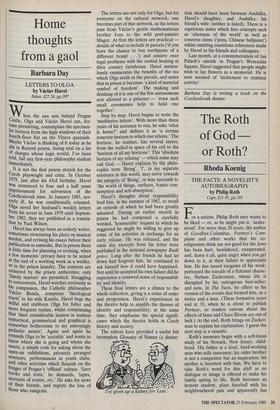Home thoughts from a gaol
Barbara Day
LEITERS TO OLGA by Vaclav Havel Faber, £27.50, pp.397
NS.
When the sun sets behind Prague Castle, Olga and Vaclav Havel can, for- tune permitting, contemplate the spectacu- lar horizon from the high windows of their fourth-floor flat on the Vltava quayside. Maybe Vaclav is thinking of it today as he sits in Ruzyne prison, facing trial on a list of charges whose logic would, I've been told, fail any first-year philosophy student Immediately. It is not the first prison stretch for the Czech playwright and critic. In October 1979, just after his 43rd birthday, Havel was sentenced to four and a half years imprisonment for subversion of the Czechoslovak state. In January 1983, sev- erely ill, he was conditionally released. Olga saved her husband's weekly letters from his arrest in June 1979 until Septem- ber 1982; they are published in a transla- tion by Paul Wilson. Havel has always been an orderly writer, sometimes structuring his plays on musical Models, and revising his essays before their publication in samizdat. But in prison there is little time for planning or revising, when a few moments' privacy have to be seized at the end of a working week as a welder, or in the prison laundry. The contents are Censored by the prison authorities; only family matters' are permitted. Struggling to concentrate, Havel watches enviously as his companion, the Catholic philosopher Vaclav Benda, composes 'theological tracts' to his wife Kamila. Havel begs the wilful and stubborn Olga for fuller and more frequent replies, whilst complaining that 'their considerable laxness in matters syntactical, grammatical and graphical is somewhat bothersome to my annoyingly Pedantic nature'. Again and again he reminds Olga to be 'sociable' and wants to know where she is going and whom she Meets; a simple code for asking about the open-air exhibitions, privately arranged seminars, performances in youth clubs, and other activities which flourish on the fringes of Prague's 'official' culture. 'Save books and texts,' he demands, 'tapes, accounts of events, etc.' He asks for news of their friends, and regrets the loss of those who emigrate. The letters are not only for Olga, but for everyone on the cultural network; one becomes part of that network, as the letters pass from Vaclav's gentle mathematician brother Ivan to the wild poet-painter Magor. At first the letters are practical details of what to include in parcels Cif you have the chance to buy toothpaste of a different brand . . .') and anxiety over legal problems with the central heating at their country farmhouse. Havel meticu- lously enumerates the benefits of the tea which Olga sends in the parcels, and notes that in prison it becomes 'a kind of material symbol of freedom'. The making and drinking of it is one of the few autonomous acts allowed to a prisoner — 'even such small ceremonies help to hold one together'. Step by step, Havel begins to write the `meditative letters'. With more than three years of his sentence to run, he asks 'what is home?' and defines it as 'a certain concrete horizon to which one relates.' The horizon, he realises, has several layers; from the walled-in space of his cell to the `horizon of all my horizons'. This 'absolute horizon of my relating' — which some may call God — Havel explains by the philo- sophic term 'Being'. 'I', in my separate existence in this world, may strive towards the integrity of 'Being', or may succumb to `the world of things, surfaces, frantic con- sumption and self-absorption'. Havel's thoughts about responsibility lead him, in the summer of 1982, to recall an episode of which he had been greatly ashamed. During an earlier stretch in prison he had composed a carefully worded, 'honourable' request in which he suggested he might be willing to give up some of his activities in exchange for an early release. He was released, and the same day excerpts from his letter were published in the national newspaper Rude prdvo. Long after the friends he had let down had forgiven him, he continued to ask himself how it could have happened. Not until he accepted his own failure did he experience a renewed sense of responsibil- ity and identity.
These final letters are a climax to the whole collection, giving it a sense of order and progression. Havel's experiences in the theatre help to amplify the themes of identity and responsibility; at the same time, they emphasise the special signifi- cance which the theatre holds in Czech history and society.
The editors have provided a useful but incomplete Glossary of Names (a distinc-
I've given up a kidney for Lent.' tion should have been between Andulka, Havel's daughter, and Andulka, his friend's wife; neither is listed). There is a capricious index which lists concepts such as 'alienness of the world' as well as concrete items (`pens, Chinese ballpoint') whilst omitting countlesss references made by Havel to his friends and colleagues.
Last month, at a commemoration of Jan Palach's suicide in Prague's Wenceslas Square, Havel suggested that people might wish to lay flowers as a memorial. He is now accused of 'incitement to criminal activity'.
Barbara Day is writing a book on the Czechoslovak theatre.
















































 Previous page
Previous page